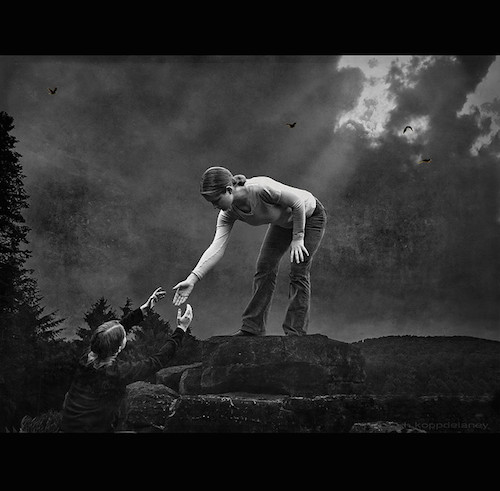I will always stand up for the underdog.
Not because they are the underdog, but because they are misunderstood. I will always play the devil’s advocate. Not to get under people’s skin, but because I can see where the other person is coming from. No, I am not special. I am just a sensitive human being that has been misunderstood.
Recently, a friend shared with me that someone we know expressed they were upset that I hadn’t told them I went to Wilderness Therapy. This is not something I hide. There is nothing to hide. And I don’t wear a yellow bandanna around my neck that says, “I went to wilderness therapy.”
I felt defensive over her comment, immediately.
At the time I was unable to understand where the feelings were coming from. Now I do.
Mental illness is so misunderstood; by those who “have” it, by western doctors, by family members, by people who have never experienced it. Mental illness is a black hole. Sometimes it catches people in its vortex and swallows them all in one gulp. Other times it will slowly begin to consume a person and somehow, some way, they manage to wrangle themselves free of it.
Once we have experienced its powerful force, we will always be aware of the possibility of it sucking us up again.
These black holes shrink and grow with different circumstances, and they don’t discriminate. They don’t give a sh*t if we are homeless, a father, a sister, a college graduate or an acclaimed doctor. Often times, the most brilliant people have the biggest black holes. They cautiously walk the line; always at the brink of their black hole.
To be clear, I would not say that every brilliant person has dealt with mental illness. If we look back in history we would see the many inventors, trail blazers and geniuses were not deemed mentally ill; they were just bizarre, odd, and quirky.
I have dealt with mental health issues a few times in my life.
My first year of college I thought I was bi-polar—I felt fucking insane. I remember writing down my thoughts, acutely aware something was off. I began to study myself. I recorded what my “triggers” were and my responses. Things weren’t lining up. I stopped drinking alcohol. I stopped smoking weed. I stopped going on social media. I started working out more. I no longer was the happy-go-lucky Mandi I deep down believed I was. Something was off and I was going to do anything I could to get back into balance: enter Wilderness Therapy.
My personal story is not the point of what I am trying to convey. Yes, my experience absolutely is a reason why I will always question the stigma around mental illness, but it is not the main reason. I have people I love very deeply who struggle everyday. We are human beings. We all have a heart. We all have feelings. We all have a brain. We all have fears. We all love something.
This is why I will always stand up for the mentally ill.
So many have experienced horrific things; not given a shot at being mentally stable. Some may have been born sensitive and were knocked around by everyday life. It doesn’t matter. They deserve love like everyone else, if not more.
Why do we ostracize them? Is it because we are afraid of being sucked in, too? Is it because we don’t understand them? Is it because we are comparing ourselves to them and feeling they don’t “deserve” to have all the attention they are getting? Or is it because they make us feel hopeless, that nothing we do can help them, and we better turn a blind eye to it?
I am not sure. I am so very curious about the reason, too. I do not understand it.
When someone we love is hurt, what do we do? We support them. We do whatever we can to ease their pain. Whether it’s physical, emotional, or a broken heart… when we really love someone, we wish only the best for them. Some people with mental illness do not have support. Some may have support but they don’t see it—they are too far into their black hole.
Personally, I know when I get really close with people with larger black holes than others, I have to walk a tight rope. I am able to connect to them, often times effortlessly. I love hearing about their art, their deepest fears, the things they love, and I stay aware, that there is always the possibility of pushing too hard, getting sucked in with them, or claiming their problems as my own.
That possibility lies with every human being I connect with, and I find these quirky people are often the most open people; therefore, the risk is higher. They don’t call me crazy—for they know what crazy is for them—they are curious about life and oftentimes they are the most wild and creative people.
They are themselves, unapologetically. They don’t know how to be anything different.
This is not to say that people without mental illness are boring. Quite the opposite. I am always so intrigued by the people who are so grounded that not even an earthquake can make them lose balance. I struggle to understand how things that would shake me to my core, barely impacts others—at least in a visible way. They are intriguing because I do not understand any part of them. They do not scare me, as mentally ill scare the mentally healthy. They are just different.
Lastly, having struggled with mental illness has been my greatest gift. Yes, gift. I understand what it feels like to feel like you’re losing your fucking mind. I understand the hallucinations, the intense fear, the heavy dread, the paranoia, the social anxiety, and the overworked nervous system. I get it.
I am not free of it. I likely will never be fully “free” of it, and that’s okay.
The black hole will always be there, shrinking and growing, flirting with me, holding me accountable. I live my life in accordance with who I am and what I believe in. I can’t drink as much as your average 24 year old, I can’t casually do drugs, I can’t put myself on the back burner like I used to, and I surely cannot pretend to be someone I am not.
My parting words are simple: Treat others the way you want to be treated.
If you were struggling with something so terrifying, so overwhelming and unpredictable, you would want help. You would feel hurt if others judged you. You would feel misunderstood by everyone including yourself. You may want to end all your suffering.
Mental illness is not a flaw. It is not for the weak. It brings you to your knees, to the depths of hell. When you come back from that scary place, you will be able to remember this. When you see others struggling, take a breath, do what feels intuitively right to you and be kind.
Please be kind. If you are the one struggling, be persistent, be brave and reach out.
You can get through it. I promise you.
Author: Amanda Heppler
Apprentice Editor: Alicia Wozniak / Editor: Renée Picard
Photo: Hartwig HKD/Flickr











Read 5 comments and reply